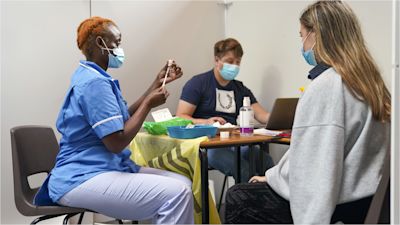UK secures 114m Covid vaccine doses for future booster schemes amid Omicron fears

The UK has made its Covid vaccine programme "future proof" after securing enough doses for booster schemes to run in both 2022 and 2023.
A deal for another 114 million jabs will see Moderna provide the UK with 60 million doses and 54 million more will come from Pfizer/BioNTech.
The new deals, which the government says it "accelerated in light" of concerns over the new Omicron variant, include access to modified vaccines which may be tailored in future to tackle any more worrying mutations.
Health Secretary Sajid Javid said the new contracts "will future proof the Great British vaccination effort" and "ensure we can protect even more people in the years ahead".
He added: “This is a national mission and our best weapon to deal with this virus and its variants is to get jabs in arms – so when you are called forward, get the jab and get boosted.”
There are concerns that vaccines could provide less protection against the new variant but the health secretary told ITV News they "remain the first line of defence".
"It's possible that they might be less effective against this new variant but its also very likely that they will remain effective against serious disease," he said.
But the World Health Organisation said governments should be focusing on people who have not yet had their first jab, rather than aiming to give health people their third.
Dr Mike Ryan, executive director of WHO's health emergencies programme, said: "The primary objective, I think of all governments, now must be, in the face of Delta and Omicron and others, is to ensure that all vulnerable individuals, people of older age, people with underlying conditions, are immediately offered the vaccine to ensure that everyone has had at least a primary course".
Asked about the acceleration of the UK's booster programme, he told a press briefing: "It's tough for some countries who have huge amounts of excess vaccine to decide who to give it to, but that's not the problem being faced by a lot of countries around the world who can't get even primary vaccination to their most vulnerable, so it's a luxurious position to be in if you're in a position to be able to have enough vaccine to do that."
A WHO epidemiologist says the world's current priority shouldn't be 'adding more vaccines to people who are already protected'
His colleague at WHO Dr Maria Kerkhove gave an impassioned plea for vaccines to be shared equally between countries.
"We need vaccines to get into the arms of all of those who are at risk in every single country, not just in some countries, and not adding more vaccines to people who are already protected, but getting that first and second dose to those individuals who are at risk in all countries," she said.
The Department for Health and Social Care said the UK remains committed to providing poorer countries with vaccines.
It said 100 million doses will have been donated to countries in need by mid-2022.
The new jabs come on top of 35 million additional doses of Pfizer/BioNTech ordered in August for delivery in the second half of next year, and the 60 million Novavax and 7.5 million GSK/Sanofi doses expected in 2022.
To speed up jab rollout as the variant spreads through the UK, the government has drafted in the help of around 400 military personnel and, as the prime minister said, new vaccine centres will be "popping up like Christmas trees".
Eligibility for the booster scheme was extended dramatically in response to the Omicron variant, which was first discovered in South Africa, and emergency Covid measures were brought in.
Face masks are once again compulsory in shops and on public transport, while flights from a number of southern African countries have been blocked and all foreign arrivals face increased testing.
Despite this, at least 32 cases have now been identified in the UK and that number is expected to rise.
Speaking to broadcasters, Mr Javid said: "As I've said recently, we do expect cases to go up." But he said the measures introduced had been "balanced and proportionate", as he added:
"Our strategy is all about buying time, buying time so that we can assess it, but also (so) that we can build our defences and we've been really clear in the last few days, I think, that the best way to continue to defend ourselves is through our fantastic vaccine programme."